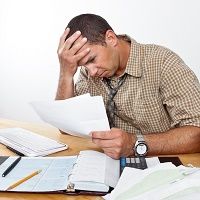Wallet Woes Can Cause More Physical Pain and Painkiller Consumption
Looking at your bank statement after you got a little too spend-happy can be cringe-worthy, but it turns out that it can cause actual physical pain.

Looking at your bank statement after you got a little too spend-happy can be cringe-worthy, but it turns out that it can cause actual physical pain.
Researchers suspected that the increasing trends of economic insecurity and complaints of physical pain were connected. So they hypothesized that feeling financially unstable is linked to more physical pain than those who feel financially secure.
An analysis of five studies revealed that economic security was associated with more physical pain and less pain tolerance. A sixth study consisting of 33,720 households in the United States showed that economic insecurity predicts consumption of over-the-counter painkillers, as described in Psychological Science.
“Overall, our findings reveal that it physically hurts to be economically insecure,” lead author Eileen Chou, PhD, from the University of Virginia, said in a news release.
- MD Magazine’s One-Stop Shop for Pain Management News
Households in which both adults were unemployed spent 20% more on over-the-counter painkillers than those in which at least one adult was working. In addition, an online survey with 187 people showed that pain reports were affected by two measures of economic insecurity — personal unemployment and state-level insecurity.
“Individuals’ subjective interpretation of their own economic security has crucial consequences above and beyond those of objective economic status,” the authors wrote. Therefore, one person’s definition of financial stability may not match someone else’s, which indicates that the pain association is personalized.
But why does money have an influence on physical pain? The researchers think that it can at least be partly attributed to the feeling of not having control on life.
“By showing that physical pain has roots in economic insecurity and feelings of lack of control, the current findings offer hope for short-circuiting the downward spiral initiated by economic insecurity and producing a new, positive cycle of well-being and pain-free experience,” the team concluded.
Not only do financial woes result in more physical pain, but it also leads to a reduction in pain tolerance and can predict over-the-counter painkiller consumption.
Also for MD Magazine >>> Stress Protein Also Worsens Chronic Pain